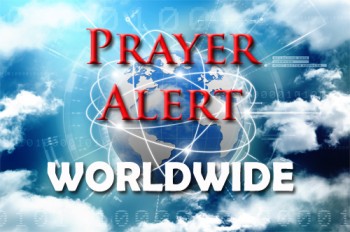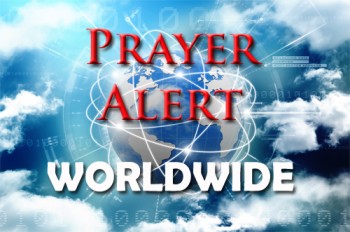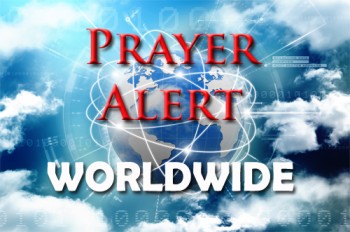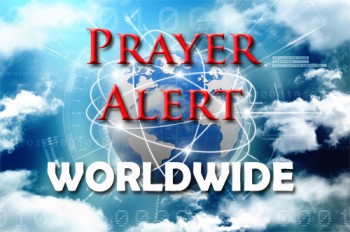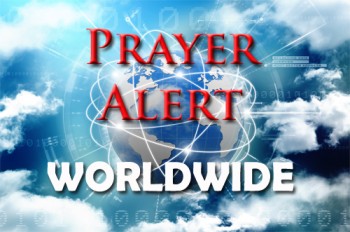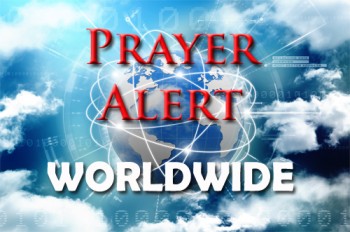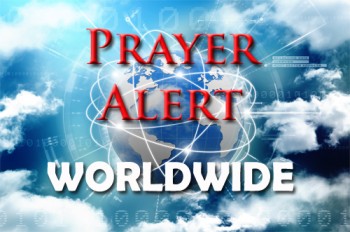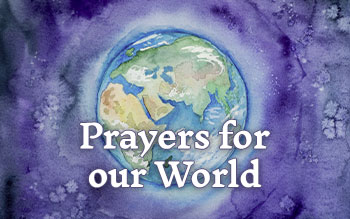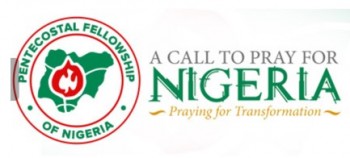Displaying items by tag: Africa
Ethiopia: at least 500 Christians slaughtered
An Ethiopian Christian leader called for an international inquiry into over 500 Christians killed since the end of June - including pregnant women, children and whole families. The coordinated slaughter was by the Muslim Oromo ethnic group who are members of Qeerroo (meaning bachelors), a male youth movement. In door-to-door attacks, they arrived in cars and, armed with guns, machetes, swords and spears, sought out and slaughtered Christians. Children were forced to witness their parents being brutally murdered with machetes. Some militants held lists of Christians and were helped by local authorities, often run by Muslims, to find individuals, particularly those actively involved in supporting the Church. Oromo ethnic Christians were also targeted. One was beheaded for refusing to deny his faith by tearing off the thread around his neck (worn as a sign of his baptism).
Egypt: women struggling to survive pandemic
Maria, an Egyptian widow, was in tears when telling a local ministry leader that she had lost her job as a housecleaner due to coronavirus lockdown. She supports seven family members, including a daughter with two infants who is separated from her drug-addicted husband and a married son with two children who has lost his job and home due to coronavirus. She sold her kitchen appliances to meet their basic needs. Many widowed women in Egypt have lost their jobs to the pandemic and have no other sources of income, as the government has also suspended disbursement of pensions due to the crowds gathering at offices. Most widows are without a fixed monthly income or a fixed pension. Some have coronavirus, and some have lost a family member to it. Christian Aid has created WhatsApp groups for women and children and supports them spiritually by making prayer times and sharing sermons and songs.
South Africa: community organises Covid-19 healthcare system
South Africa’s pandemic infections seem to have reached a ceiling. However, with the fifth highest total in the world, no one is celebrating. The government had months to prepare, but there is a critical shortage of beds, staff and equipment. There are allegations of corruption by public officials ordering coronavirus-related supplies. As chaos and uncertainty swirled around official responses to the virus, a group of Muslims, Hindus, Sikhs and Christians living and working in Lenasia decided to construct their own response as thousands of locals fell ill. Aboobaker Sayed started a community healthcare system in the middle of the raging pandemic with a community-run ambulance service; he secured advanced medical equipment and oxygen concentrators, and has turned ordinary bedrooms into critical care beds. He said, ‘We make plans, but God has another plan and He is the best of planners, so we leave it to Him’.
Cameroon: Bible translator killed
Bible translator and literacy teacher Pastor Christopher Tanjoh was killed on 7 August following an attack in his village. Last year two other Bible translators in Cameroon died in similar incidents. He bled to death after being shot in the leg, leaving behind a wife and seven children. Wycliffe’s executive director said, ‘This tragic news reminds us how much the gospel message is urgently needed in Cameroon. Until people are transformed by Jesus, there will be no lasting peace. We continue to work with local partners to translate the Bible so that every Cameroonian can read the Bible in the language that speaks to them best.’
Kenya: calls for advice on abortion
The Kenyan Senate is calling for submissions on the Reproductive Healthcare Bill currently before them, which legalises abortion up to birth. There has been an outcry among Kenyan Christians over this bill; it seeks to legalise abortion carried out by a doctor, nurse or midwife acting alone, a ‘trained health professional’. The international abortion lobby and their NGO allies will be emailing their opinions in droves. There is money to be made if abortion becomes legal in Kenya. The time is short for objections to be presented as the deadline is Monday 17 August. The published notice does not specify that only Kenyans can respond, so we can pray that many Godly, informed responses will be made against this bill from concerned individuals across the nations.
Nigeria: stop killing in Southern Kaduna
Since January there have been constant murders, looting, rape and abductions of Christians in Southern Kaduna. On 9 August a series of short videos entitled ‘Stop the Killings in Southern Kaduna’ was released as part of a campaign calling for an end to targeting Christian communities. The videos feature high-profile celebrities, actors, comedians, music artists and business executives. The president of the Southern Kaduna Peoples Union said, ‘There is no greater lie than the narrative that the killings in southern Kaduna are between farmers and herders. 75% of the victims were women and children’. CSW has called for effective action to address the situation and echoes the Nigerian entertainment industry which has spoken out about the relentless loss of life. CSW says, ‘We continue to call for urgent international interventions, including the convening of a special session of the UN human rights council, with particular focus on the current crisis in southern Kaduna and Plateau State.’
Burkina Faso: climate change forces children into dangerous work
Farming used to be a key source of income in Burkina Faso, but the climate crisis has made the weather unpredictable, crops fail, and families have few other opportunities to earn money to survive. 80% of the population is dependent on agriculture to earn an income. When crops fail, families go hungry, and they are forced to make hard decisions so that they can survive. Parents are now sending their children to work in the gold mines. It is dangerous and no place for a child, nevertheless thousands of children now work there. They work instead of going to school, and miss out on being children, playing with their friends, learning, and dreaming. However, Tearfund’s local partner CREDO is working with farmers to help restore the soil and provide training on new farming techniques and harvesting climate-resistant crops.
Mozambique: churches burned, beheadings and coronavirus
On 23 July the Catholic bishop of Pemba spoke out deploring the world’s indifference to escalating extremist violence in northern Mozambique, where multiple churches have been burnt, people beheaded, young girls kidnapped, and over 200,000 people displaced by the violent insurgency. Parliamentarian Paulo Rangel said. There are reports of insurgents beheading fifteen people in a week. Pray for the Church as it works with families who have suffered attacks and have lost everything. Also there is coronavirus in nine out of Mozambique’s ten provinces. Pray for organisations focusing on preventing contagion by disseminating information and raising awareness. Pray for those distributing essential aid to meet families’ immediate needs, including food, seeds, and hygiene kits. See https://www.actionaid.org.uk/about-us/where-we-work/mozambique
Nigeria: 'Incessant killing more dangerous than Coronavirus'
Report on Nigeria to UK Parliament
“The incessant killing is more dangerous than Coronavirus” …The words of a community leader in central Nigeria – after coronavirus had reached his country – after an April attack in which nine people died, including a pregnant woman and her three year old.
His reaction is one of several testimonies – frequently harrowing to read, let alone to have experienced – that feature in an Inquiry into the scale of death and destruction caused by conflict occurring along the Christian-Muslim faultline running across the ‘Middle Belt’ of Nigeria, Africa’s most populous nation.
The Inquiry is published today, 15 June, by the All Party Parliamentary Group (APPG) for International Freedom of Religion or Belief of the UK Parliament; it has been taking evidence since autumn 2018.
(However, since the Coronavirus pandemic, violence appears to have grown even as international media have been otherwise occupied).
“APPG members have been alarmed by the dramatic and escalating violence in Nigeria characterised as the farmer-herder conflict. This violence has manifested along ideological lines, as the herders are predominantly ethnic Fulani Muslims and the farmers are predominantly Christians. There has been significant debate about what factors are driving and exacerbating this crisis. Therefore, the APPG launched a parliamentary inquiry to help develop a nuanced understanding of the drivers of violence”.
The resulting report ‘Nigeria: Unfolding Genocide?’ points out that the violence has claimed the lives of thousands of people and displaced hundreds of thousands more. It has caused untold human and economic devastation and heightened existing ethno-religious tensions. “The [age old farmer-herder] conflict has evolved from spontaneous reactions to provocations and now to deadlier planned attacks” it quotes the International Crisis Group as saying.
Despite the scale of the violence, the conflict is much less well known internationally than the 10 year long Boko Haram insurgency which has claimed over 30,000 lives (112 Chibok girls are still ‘missing’ after 6 years) and now its offshoot Islamic State West African Province’s (ISWAP) atrocities. These also feature in the APPG report and appear to have escalated in recent weeks and months. (In the latest Boko Haram-linked incidents this past week, over a hundred have died and hundreds more been injured; a UN humanitarian hub and a police station were reported burned down).
However, this APPG report echoes the Global Terrorist Index (GTI) 2019 by the Institute for Economics and Peace, which indicates that the primary driver of the increase in violence in sub-Saharan Africa is a rise in activity in Nigeria attributed, not to Boko Haram, ISWAP or Ansar ul Islam, but to Fulani militant extremists. In 2018, it appears Fulani extremists were responsible for the majority of terror-related deaths in Nigeria.
Its geographical footprint is also larger, with conflict manifesting in more States.[1] According to global NGO, Search for Common Ground (SfCG), “between 1 January 2019 and 1 January 2020, inter-communal violence represented the most severe threat to civilian lives in Nigeria.”[2]
In his report for the UK’s Foreign and Commonwealth Office a year ago, the Bishop of Truro concluded “the religious dimension is a significantly exacerbating factor” in clashes between farmers and herders and “targeted violence against Christian communities in the context of worship suggests that religion plays a key part.”[3]
The Nigerian Government’s attempts to resolve the ethno-religious conflict have been ineffective; there seems to be no end in sight. The long-term consequences of failure to reduce the violence are severe, says the Inquiry: “There is the enormous cost in terms of human lives but there is also the potential for economic collapse, famine, further mass displacement of civilians and even more conflict, as the two major religious groups in the country become increasingly polarised”.
Pray: that the perpetrators of these atrocities will be brought to justice.
Pray: for the victims and families of these terrorist attacks.
Pray: for a breakthrough in the efforts of the Nigerian government to broker lasting peace in the region.
Pray: that the world community will come together to bring about pressure on the Nigerian politicians to deal with the situation at all levels.
Pray: against the powers of darkness that they will be overcome IJN.
Nigeria: PLEA FOR INTERCESSION – Pastor Austen Ukachi
Nigeria is presently passing through one of her most difficult times in history. The church is facing an existential threat from islamists with a clear agenda to overrun the entire nation.
Unfortunately, there is a conspiracy of silence by the international media concerning the atrocities taking place in Nigeria (similar to what happened in 1994 before the genocide in Rwanda). In an opinion piece on The Wall Street Journal of 20th December, 2019, Bernard-Henri Lévy wrote: “A slow-motion war is under way in Africa’s most populous country. It’s a massacre of Christians, massive in scale and horrific in brutality. And the world has hardly noticed.”
In recent years, Nigeria has been consistently ranked among the top five nations on the Global Terrorism Index. Of the four deadliest terrorist groups in the world, three operate in Nigeria: Islamic State of West Africa Province, ISWAP, an offshoot of ISIS; Boko Haram; and Fulani Herdsmen (militants). In Nigeria, the three groups are united in their goal to exterminate Christians especially in Northern Nigeria and ultimately make Nigeria an Islamic nation. They seem to have the will and wherewithal to accomplish their goal unless the Lord stops them.
In the past, they were restrained by government’s honest prosecution of the war against terrorism. But in the last five years, a new government, led by people who have been accused of being sympathetic to the Islamic agenda, has been unsuccessful in stemming the rampage of the terrorist groups. Curiously, almost the entire military and security agencies of Nigeria are under the control of devout Muslims (mostly Fulanis), some of whom have been accused of aiding and abetting the terrorists. A respected former president of Nigeria, Chief Olusegun Obasanjo, has openly accused the government of having a “fulanisation and islamisation agenda.”
The well-known historian and theologian, Professor Philip Jenkins, in his book entitled, The Next Christendom, aptly stated that: “At least, 45% of Nigerians are currently Christians, some 72 million people. But how will the number change in future decades? No church or religion has a guaranteed market share in any country. It is quite possible to imagine a scenario in which the proportion of the Nigerian Christians could fall as low as 10% in the event of persecution or a successful jihad by the nation’s Muslims. The figure could rise higher if a sweeping Christian revival were to occur.” The activities of the terrorists and the policies of the government are tending towards the former. The only acceptable option for the church in Nigeria is revival, that is why we must pray.
See Obianuju Ekeocha's emotive video pleading for prayer and action on this serious situation in Northern Nigeria. It contains graphic images of the Kukum Daji massacre aftermath that took place in July 2020:
The following prayer points are only a guide. May the Lord bring us to the depth of prayers that would stem this rising tide of violence in Nigeria.
1. TERRORIST GROUPS. ISWAP, Boko Haram, and Fulani Herdsmen are ranked 2nd, 3rd and 4th on the Global Terrorism Index. The Nigerian government does not still consider militant Fulani Herdsmen a terrorist group. This has enabled them to continue with their mayhem against Christian communities while the security officers look the other way. The activities of the herdsmen now extend to virtually every part of the country. There are speculations that it is a modern form of jihad. Pray that God would stir up a national and international outcry and action against these groups.
2. PERSECUTION OF CHRISTIANS IN THE NORTH. Pray that God would strengthen the Christians in the north. Many pastors and their members have been murdered by Islamic fundamentalists. Sometimes, these executions are carried out in the community square before children and other onlookers to inflict further pain on those who survive. Many of these Believers have been traumatised and scared for life. Pray for God to heal their emotions and strengthen their faith.
3. ECONOMIC JIHAD. There is an ‘economic jihad’ that is being waged against non-Muslims, especially Christians. Christians are losing their jobs and are being replaced by Muslims; Christian farm lands are either expropriated by state governments in the North or forcefully taken over by Fulani herders. Pray for God to comfort and provide for His people in their sufferings.
Download the full Nigeria Prayer Guide with 16 different prayer pointers from the IPC Website
Pastor Austen Ukachi – IPC West Africa Director
